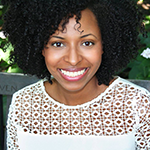Getting to Know Marisol Norris
March 19, 2021
 Despite being the newest full time faculty member in the Department of Creative Arts Therapies, Marisol Norris, PhD, has a long history at the College of Nursing and Health Professions. Norris is an alumna, earning her MA in 2011 and PhD in 2019. Now she has returned as the director of the music therapy and counseling master’s program.
Despite being the newest full time faculty member in the Department of Creative Arts Therapies, Marisol Norris, PhD, has a long history at the College of Nursing and Health Professions. Norris is an alumna, earning her MA in 2011 and PhD in 2019. Now she has returned as the director of the music therapy and counseling master’s program.
What is your Alma Mater?
After receiving bachelor's degrees in Vocal Performance and Pedagogy, Music and Psychology from my HBCU, Oakwood University, I moved to Philadelphia and completed my master's and doctoral degrees in Creative Arts Therapies at Drexel University
What are the courses you teach?
I joined Drexel in February 2021 as an assistant clinical professor and the new director of the Music Therapy and Counseling master's program in the Creative Arts Therapies department. Our courses center the human need for wholeness within relational experience and the function of artistic processes to deepen this capacity, particularly within medical, rehabilitative and community settings. I'll be teaching courses that foster music therapy students' development not only as effective healthcare practitioners but stewards, advocates and leaders in our profession.
What is your current research?
My current research and scholarship explore pedagogical approaches for culturally sustaining healthcare practice and radical healing frameworks within Black communities. This specifically includes the discursive construction of race, gender, class and sexuality in creative arts therapies theory and praxis and the role of Black clients' aesthetics within mono- and cross-cultural music therapy meaning-making processes.
What are your areas of interest and curiosity?
As a cultural worker, organizer, music therapist and arts therapist educator, I've become more and more interested in the work of somatic abolitionism. My experience professionally navigating race- and gender-based trauma has deepened my understanding of the multiple ways trauma is lodged in the body. I'm interested in the ways somatic abolitionism serves as a liberatory work that not only dislodges our beings from dominant systems that transgress upon the body but also seeks to uphold practices that may be suppressed in dominant-oriented medical settings. Somatic abolitionism honors the belief that all people must experience somatic freedom and that our humanity can be reclaimed and preserved through embodied practices that allow the integration of our physical, sensorial, energetic, emotional, cognitive, spiritual, relational and collective being.
What is something most people do not know about you?
I come from a creative family. In addition to the various professional roles my family members hold, they've actively contributed to local communities through the arts. My mother is an actress and playwright, my father is a dedicated musician, my sister is a choreographer, singer/songwriter and the list can go on. I'm a product of their creativity and artistic commitment to the communities we belong to and serve in many ways.
What is your best stress reliever?
I picked up the hobby of woodworking a while back. I find the process of carving and sanding a big stress reliever. It typically slows me down and heightens my ability to focus.
What are some words to live by?
Poet Kate Rushin, in her poem, "The Bridge," talks about the development of self-knowledge and the purposeful use of self that I often connect to the person-of-the-therapist work developed in Drexel's Counseling and Family Therapy department and lead by Harry Aponte, HD, MSW,. I believe this is foundational in therapists' education and life-long work. Rushin writes, "I must translate my own fears, mediate my own weaknesses, I must be the bridge to… my true self, and then I will be useful."